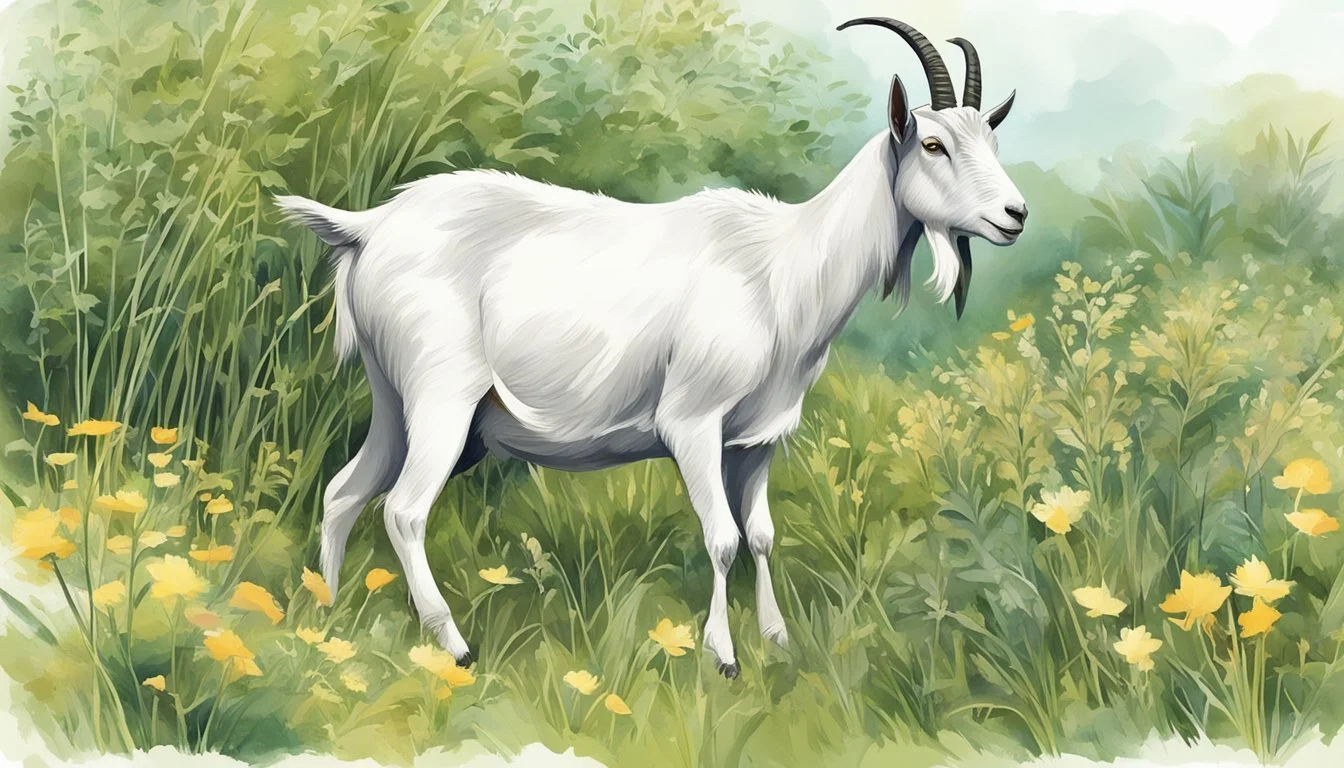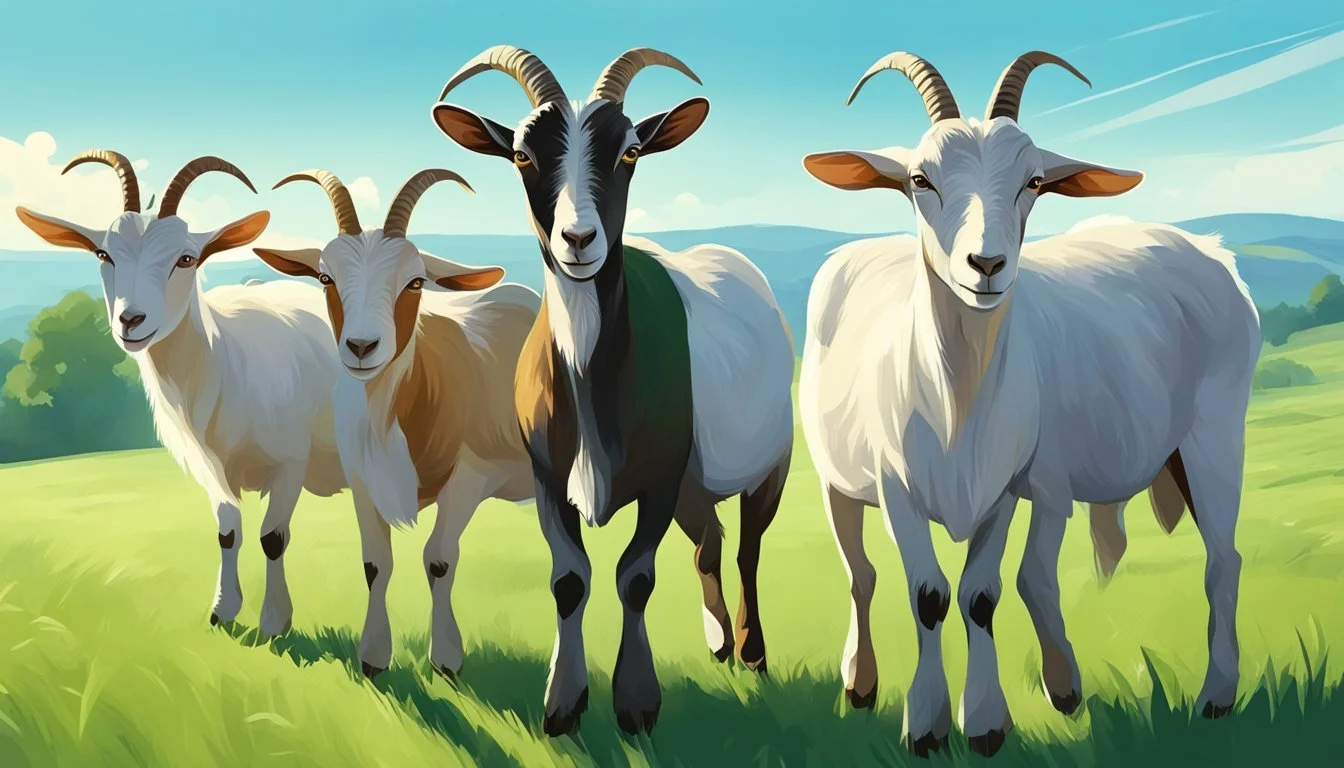Can Goats Survive on Grass Alone?
Understanding Caprine Dietary Needs
Goats, known for their hardiness and versatility as domesticated animals, are often subject to the question of whether they can subsist solely on grass. The dietary needs of goats have been studied by the agricultural community to determine the viability of grass as their exclusive food source. While grass forms a part of their natural intake, there is a consensus that goats require more than just grass to maintain optimal health. They are browsers by nature, preferring a diet that includes a variety of foliage, such as shrubs, weeds, and other plants to meet their nutritional needs.
The idea that goats can survive on grass alone oversimplifies their complex dietary requirements. Proper goat nutrition entails not just energy, but also a balance of protein, vitamins, and minerals that grass alone cannot fully provide. Goats thrive on a mixed diet that includes high-quality hay, fresh browse, and the necessary supplements, such as a goat mineral mix or kelp meal. When goats are limited to grass only, they may face malnutrition and related health issues.
A diet limited to grass might lead to a decline in a goat's health, particularly if the grass lacks the necessary nutrients or is not abundant enough to meet the goat's daily needs. Thus, while goats may manage on a grass-based diet for short periods, it is not a sustainable or advisable long-term feeding strategy. For more detailed insights, examining the nutritional factors critical for goat well-being is essential.
Goat Dietary Basics
Understanding the dietary essentials of goats is crucial for their survival and overall well-being. They require a balanced intake of nutrients, proper digestion mechanisms, and suitable food choices to maintain health.
Nutritional Needs
Goats necessitate a diet that fulfills their nutrient requirements, including water, protein, energy, fiber, and fat. These nutrients are vital for their growth, reproduction, lactation, and maintenance of body functions.
Protein: Essential for growth and repair of body tissues.
Energy: Supplied through carbohydrates and fats, necessary for daily activities.
Fiber: Important for proper rumination and digestion.
Fat: Provides concentrated energy and helps in nutrient absorption.
Water: Fundamental for all physiological processes.
Grass Diet Potential
While grass can be a component of a goat's diet, it alone does not provide a comprehensive range of needed nutrients. Goats thrive on a diet that includes a diversity of forages, supplemented with grains and minerals if required.
Grass: Serves as a fiber source but is low in protein and energy.
Forage Diversity: Encourages a balanced intake of nutrients.
Supplements: Grains and minerals may be added to enhance diet efficacy.
Ruminant Digestive System
Goats, as ruminant animals, have a specialized digestive system that efficiently breaks down plant-based food. Their multi-chambered stomach allows for fermentation and breakdown of fiber, transforming it into usable energy.
Reticulum: Traps foreign materials and prepares food for rumination.
Rumen: Ferments food with the aid of microbes, breaking down fiber.
Omasum: Absorbs water and nutrients.
Abomasum: The "true stomach" where final digestion occurs.
Essential Nutrients for Goats
Goats require a diverse set of nutrients to maintain optimal health and productivity. Deficiencies or imbalances can lead to growth, reproductive, and lactation problems.
Vitamins and Minerals
Goats need a variety of vitamins and minerals for bodily functions. Essential minerals like calcium and phosphorus are crucial for bone development and maintenance. Selenium and copper, although needed in smaller quantities, are vital for immune system function and overall health. Moreover, goats require salt to balance body fluids and prevent sodium deficiencies. Zinc is another mineral that plays a role in skin health and wound healing.
Mineral: Calcium
Function: Bone growth and maintenance
Mineral: Phosphorus
Function: Energy storage and metabolism
Mineral: Selenium
Function: Antioxidant and immunity
Mineral: Copper
Function: Blood health and iron uptake
Mineral: Zinc
Function: Skin integrity and enzymes
Vitamins are also critical, with goats needing an ample supply of vitamin A for vision and immune function, and vitamin D for calcium absorption.
Protein and Fiber
The protein content in a goat's diet is essential for growth, repair, and production. Goats utilize fiber primarily from hay, which is key for proper digestion and gut health. Legume hays, such as alfalfa, are particularly valuable as they provide both high levels of protein and fiber.
Protein: Necessary for muscle and tissue repair
Fiber: Aids in digestion and provides roughage
Fat and Energy Content
Fat constitutes an important energy source for goats. It provides concentrated energy, which can be particularly beneficial in colder months or for lactating does. However, the fat in a goat's diet must be monitored to prevent obesity and related health issues. They obtain energy not only from fats but also from carbohydrates in their feed.
Fat: Supplies dense energy and aids in absorption of fat-soluble vitamins
Energy: Required for basic metabolic processes, growth, and lactation
Understanding and providing the proper balance of these essential nutrients is vital for the health and well-being of goats.
Foraging Behavior and Diet Variety
Goats are complex foragers with dietary preferences that extend beyond simple grass grazing. Their survival is interconnected with their ability to consume a wide range of forage, from grasses and weeds to woody shrubs and trees.
Natural Grazers
Goats inherently display a strong inclination for grazing. As natural grazers, they spend a significant portion of their day feeding on various plants available in their environment. Unlike other grazing animals that may primarily consume grass, goats’ diet often comprises a mixture of grasses, clover, alfalfa, herbs, forbs, and weeds. This diverse diet fulfills their complex dietary needs and contributes to their overall health and wellbeing.
Browsing versus Grazing
These animals exhibit behaviors characteristic of both browsers and grazers, adeptly switching between the two. While grazing primarily involves eating grasses, browsing is the act of feeding on leaves, twigs, and woody shrubs. Goats, therefore, can be classified as selective grazers, often preferring to browse when given the opportunity. This preference for browsing provides them with unique nutritional variety and mental stimulation.
Diversity of Plant Intake
The diversity of plant intake in goats is essential for their survival. They are known to consume a range of vegetation that many other grazing animals might avoid. For instance, goats incorporate a significant amount of woody shrubs and trees into their diets, alongside traditional grasses. This capability to forage on a variety of plants, including those with high nutritional value like clover and alfalfa, allows goats to maintain their health in environments where other grazing animals might struggle. Moreover, the grazing patterns and habits of goats are such that they often seek out and consume forbs and weeds, which other animals might overlook, ensuring a balanced and diverse diet necessary for their sustenance.
Supplemental Feeding and Alternatives
While goats require a diverse diet to maintain optimum health, relying on grass alone is insufficient. To compensate for dietary deficiencies, various supplemental feed options are provided, each serving a specific nutritional purpose.
Grains and Concentrates
Grains and concentrates are a vital part of a goat's diet to ensure they receive enough energy, particularly during colder months or for lactating does. Common grains such as corn and barley are combined with concentrates for additional nutrients. This supplementation helps to balance the diet where grass falls short in energy provision.
Grains: corn, barley, oats
Concentrates: protein pellets, formulated goat feed
Hay and Silage
Hay, including alfalfa, clover, and other mixed hay, is an essential component for goats, supplying necessary fibers and aiding in proper digestion. If fresh forage is unavailable, silage - preserved green fodder - can be a nutritious alternative, though one must ensure it's free from mold for the health of the goats.
Hay types: alfalfa, clover, timothy
Silage: fermented high-moisture stored fodder
Herbal and Vegetable Supplementation
Herbs and vegetables complement a goat's diet with essential vitamins and minerals not fully provided by grass. Common vegetables like carrots and bananas are enjoyed by goats and can boost nutrient intake. Additionally, fresh mint can provide digestive benefits, while apples, pears, and watermelon add variety and hydration to their diet.
Vegetables: carrots, bananas
Fruits: apples, watermelon, pears
Herbs: mint
Health Considerations for Goats
In managing the health of goats, it is critical to ensure they receive a balanced diet and proper care to minimize the risks of dietary deficiencies and common health problems, while also implementing effective parasite management strategies.
Minimizing Risks of Deficiencies
The diet of goats should be formulated to prevent nutritional deficiencies. Pasture alone often lacks essential nutrients required for optimal health. Supplementation with minerals like iron and manganese, as well as antioxidants, is necessary to maintain a robust digestive system and overall health. Incorporating high-quality hay, grains, and commercial goat feed that contains a mix of vitamins and minerals can help prevent malnutrition.
Key Supplements:
Vitamins A, D, E
Minerals such as selenium, zinc, copper
High-quality proteins
Common Health Problems
Goats are susceptible to various health problems associated with poor diet and management. Malnutrition can lead to a weakened immune system, making goats more prone to diseases. A lack of essential nutrients can also cause digestive issues and poor growth rates. Observing goats for signs of illness, such as changes in appetite or behavior, is essential. Early detection and intervention can mitigate the risks to their health and well-being.
Signs of Nutritional Deficiencies:
Weight loss or poor weight gain
Dull coat
Weakness or lethargy
Parasite Management
Effective parasite management is crucial for maintaining goat health. Goats grazing in pasture are at risk of internal parasites, which can cause severe health issues if left unchecked. Regular fecal examinations can help identify the burden of parasites, and targeted deworming protocols can be used to control them.
Parasite Control Methods:
Rotational grazing
Fecal egg counts to guide deworming
Targeted deworming schedule
It is important to make sure that the chosen methods to control parasites are part of an integrated approach to health, including proper nutrition and housing, to reduce the overall parasite load and minimize the need for medication.
Practical Aspects of Goat Care
The practicalities of goat care revolve around providing a balanced diet, ensuring suitable environmental conditions, and understanding common dietary misconceptions to maintain the health and productivity of goats.
Feeding Practices
Goats require a nutritious diet that accommodates their unique dietary needs. They are browsers, not just grazers like cattle or sheep, and while do goats eat grass?, the answer is yes, but they cannot survive on grass alone. Their diet should be varied and include:
Forages: Such as grass, hay, shrubs, and other plants.
Concentrates: Grains can provide additional energy and protein.
Minerals: Essential minerals can be offered through a salt block or loose mix.
Here's a brief overview of what not to feed goats, as certain foods can be harmful:
Azaleas, rhododendron, and cherry plants are toxic to goats.
High amounts of onions and garlic can lead to blood cell damage.
Excess grain can disrupt a goat’s digestive system, leading to diseases.
Environmental Adaptations
Goats are known for their adaptability to various environments, a trait that makes them suitable for diverse farming contexts. They can adjust to harsh conditions and are often used to clear rough, overgrown land, including your lawn. However, adequate shelter and protection from extreme weather are necessary as part of responsible goat care.
Common Questions About Goat Feeding
How do you feed goats cheaply? Utilizing pasture and browsing can reduce feed costs, complemented by economical sources of hay and grains. Do goats need salt blocks? Yes, goats need salt and other minerals for optimal health. A salt block or loose mineral mix can meet these needs. Remember, a goat owner should prioritize their animals' nutritional needs to prevent deficiencies and promote overall well-being.






